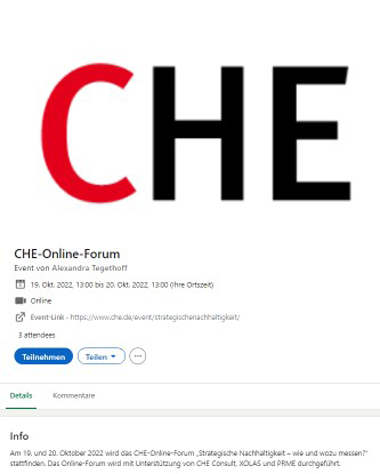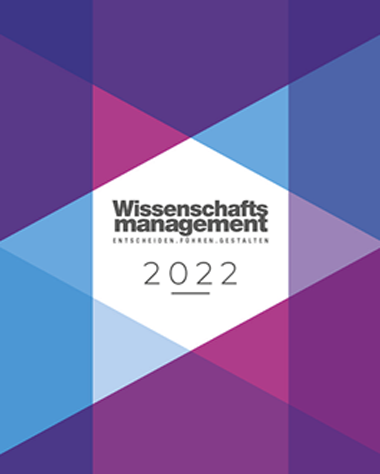No products in the cart.
Archiv

Register now: CHE Online Forum
30 August 2022
On 19 and 20 October 2022, the CHE Online Forum “Strategische Nachhaltigkeit – wie und wozu messen?” (German) will take place. The online forum will be held with the support of CHE Consult, XOLAS and PRME.
Sustainability has become a central challenge for higher education institutions on various levels. A prerequisite for managing sustainability processes based on empirical evidence is the measurement of sustainability. The CHE Online Forum addresses questions of necessity, operationalisation and application as well as opportunities and risks of measuring sustainability strategies.
Global challenges such as advancing climate change, resource scarcity, threatening biodiversity loss as well as inter- and intra-state conflicts and social inequalities threaten present and future life. A comprehensive transformation is needed to put society as a whole on the path to sustainable development. But what role does the institution of higher education play in this context?
If universities want to make a positive contribution to a sustainable societal transformation process, this must relate to several levels: On the one hand, this positive contribution refers to primary performance dimensions of higher education institutions (teaching and studies, pedagogy, research, avoidance of unethical cooperation) and to management and organisation of higher education institutions (e.g. energy and resource management). On the other hand, non-university activities are expected, such as intensified cooperation with primarily local actors from society and business, especially in the form of sustainability-related projects. In addition, students demand a “more open ear” from the respective university management for student concerns as well as active support of student initiatives by the university.
The forum will address these topics in keynote speeches and interactive workshop sessions, from the management of sustainability in universities, the consideration of sustainability aspects in studies and teaching, including sustainable management teaching, as well as in research and transfer. Special attention will be paid to the measurability and measurement of the different aspects of sustainability. Keynote speakers are:
- Prof. em. Dr. Thomas Dyllick, Director at the Institute for Business Sustainability CH-IB, Prof. em. for sustainable management and former Vice President University of St. Gallen,
- Prof. Dr. Elisabeth Fröhlich, President (acting) of the CBS Cologne Business School, and
- Regina Obexer, Senior Lecturer & UN PRME Coordinator at MCI | The Entrepreneurial School

Effects of a team coaching
17 August 2022
In an article for the journal “Wissenschaftsmanagement”, Jens Engelke, Principal Consultant at CHE Consult, presents an example of how team coaching is carried out, including all the essential steps.
The article is based on a team coaching that was carried out at a university. At the same time, the article generalises corresponding procedures in order to give the reader suggestions for team coaching.
The initial situation for the team coaching was characterised by a certain dissatisfaction of the employees in an organisational unit of the university administration. The team consisted of seven people and a manager. Some of the people had been working in the same position for many years, others were new to the team. The team’s areas of responsibility were partly changed, processes were digitalised and thus also modified. All in all, there were numerous major and minor changes for the team.
Jens Engelke describes three phases of team coaching:
Phase 1: Preparing the team for coaching and establishing a trusting working relationship.
Phase 2: Conducting a workshop to identify and discuss the team’s strengths and weaknesses, agreeing on solutions.
Phase 3: Introduce a feedback culture in which positive aspects are mentioned and negative aspects are communicated constructively.
According to the authors, teams or working groups should use team coaching when there is potential for improving cooperation and not only when there is conflict.
Successful team coaching requires an internal or external expert to ensure that critical situations are always discussed constructively at crucial moments, thus maintaining the positive dynamics of a team coaching workshop.
